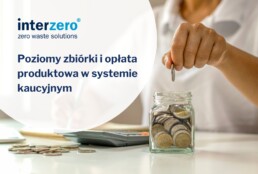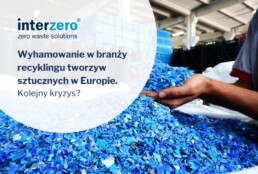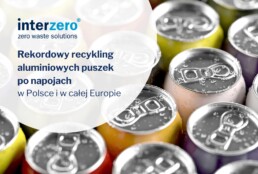Net zero 2050 at risk? European Union may fail to meet climate neutrality target
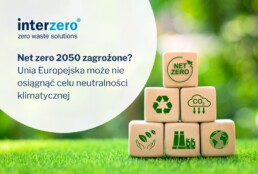
Newsletter
Climate neutrality 2050 unrealistic. WWF leaves no illusions
- The current rate of change is not enough for the European Union to achieve carbon neutrality by 2050, says Miroslaw Proppe, President of the World Wide Fund for Nature (WWF) Poland. - In my opinion today we have technologies that are sufficient to achieve only 70 per cent of this target.
According to the WWF president, the EU's ambitious target is also not helped by the Donald Trump administration's anti-climate policies. Watching events from overseas, including the US withdrawal from the Paris Agreement, many people may turn their backs on environmental action.
- In the absence of decarbonisation the world is on track to increase global warming by 3 degrees Celsius by 2100. [...] Investing just 2 per cent of global GDP would limit warming to less than 2 degrees Celsius and allow us to adapt to most of its consequences," concluded Mikołaj Troczyński of the WWF Poland Foundation. The expert referred to data from a March report by the Boston Consulting Group.
Achieving climate neutrality in 2050 would require an increase in clean technology investment to €28 trillion, or 4% of EU GDP. Importantly, the constraint is not just financial shortfalls, but also the state of technological development. As Proppe points out, the technologies needed to close the 30 per cent gap are currently in the testing phase and will not be deployable until a very distant future.
5% GDP over the next 25 years - that's the cost of decarbonisation in Poland
According to WWF expert estimates, the Polish road to decarbonisation will be even more costly than the transformation of the entire EU. According to various sources, achieving climate neutrality by 2050 would require an increase in decarbonisation expenditures to 4.5-5% GDP. Nikolai Trochinskiy points out, however, that freeing ourselves from coal could increase Poland's GDP by a minimum of 4%. The investment therefore seems justified, especially as staying with coal could cost more than 2 trillion zloty.
What is net zero, or climate neutrality?
Climate neutrality, also known as carbon neutrality or net zero, means maintaining the balance between atmospheric emissions and absorption of CO2 from the atmosphere. The purpose of such emissions balancing is to reduction of environmental pollution by reducing greenhouse gas emissions.
In pursuit of climate neutrality 2 mechanisms are most commonly used: offsetting of emissions (so-called carbon offset) and use of carbon dioxide canisters. The key natural sinks of CO2 from the atmosphere are forests, oceans and soil. It is estimated that they are capable of absorbing between 9.5 and 11 gigatonnes of CO2 per year. As the 2021 figures show, this is only a drop in the ocean of needs - annual global emissions for 2021 were as high as 37.8 gigatonnes of CO2.
Net zero 2050 as an objective of EU climate policy
The European Union wants to achieve climate neutrality by 2050. The first stop on the way to this goal is to reduce emissions by at least 55% by 2030. (the so-called Fit for 55). It presupposes reaching out to the so-called low hanging fruits - prioritising rapid and predictable emission reductions while enhancing the role of natural sinks. The next step is to achieve a 90 per cent reduction in emissions by 2040. In both cases, the reference point for calculations is the 1990 emissions level.
The EU's aim is to improve the use of forests as natural sinks. However, this alone is not enough - a number of measures are also needed to help offset emissions.
Zero-carbon by 2050 is a goal that stems from EU legislation - Regulation (EU) 2021/1119 of the European Parliament and of the Council obliges all EU institutions and Member States to take the necessary measures to balance emissions and achieve climate neutrality by 2050. Net zero is also a key tenet of the European Green Deal and is in line with international treaties, notably the Paris Agreement.
What about after 2050? As the regulation reads, after climate neutrality is achieved, the EU's target will be negative emissions. As with net zero 2050, this goal is to be achieved mainly by strengthening the role of natural sinks while reducing existing emissions.
Ecosystem restoration would help to maintain, manage and enhance natural sinks, as well as promote biodiversity and combat climate change at the same time. Furthermore, through their triple role of absorbing, storing and replacing, forests contribute to reducing greenhouse gas emissions into the atmosphere, while ensuring that forests continue to grow and provide many other services.
Sources:
- The European Union will not achieve carbon neutrality by 2050., https://portalkomunalny.pl/unia-europejska-nie-osiagnie-neutralnosci-emisyjnej-do-2050-r-581244/
- https://eur-lex.europa.eu/legal-content/PL/ALL/?uri=CELEX:32021R1119
Collection levels and product fee in a deposit system
Why do we need a deposit system? Minimum levels of separate collection of packaging
One of the main objectives of introducing a bail system in Poland is to achieving very high collection targets for packaging of beverages and the waste generated from these packages. According to experts, their achievement would not have been possible without deposit system. Its introduction was therefore a necessity, not an option.
The minimum levels of separate collection of packaging and packaging waste are set out in Annex 1a to the amended Act of 13 June 2013 on Packaging and Packaging Waste Management and amount to:
| Type of packaging | Level of separate collection | |
| between 2025 and 2028 | in 2029 and beyond | |
| single-use plastic beverage bottles up to 3 l | 77% | 90% |
| metal cans up to 1 l | 77% | 90% |
| Reusable glass bottles up to 1.5 litres | 77% | 90% |
Due to Postponement of the launch of the deposit scheme until 1 October 2025., the recycling levels for 2025 will be calculated on the basis of the weight of packaging placed on the market between 1 October and 31 December 2025.
Collection levels and deposit system implications of the SUP Directive
The need to set minimum collection levels in the Polish bail law arose from the need to the transposition into national law of Directive (EU) 2019/904 of the European Parliament and of the Council of 5 June 2019 on reducing the environmental impact of certain plastic products, abbreviated as follows SUP Directive.
Article 9 of the Directive committed all Member States to take measures to ensure by 2025. 77% the level of separate collection single-use plastic products. It also proposed measures that could help achieve this goal, i.e. the establishment of a deposit return system and the setting of targets for separate collection. As is not difficult to guess, Poland has implemented both of these proposals.
What if collection rates are not achieved? Product fee rates under the deposit system
The consequence of failing to achieve minimum collection rates under the deposit system is to the need to bring product levy. It shall be calculated separately for each type of packaging covered by the bail system.
In the initial period of the Polish deposit system, the rates of the product fee were set at a relatively low level, much lower than that provided for other types of packaging. However, they will gradually increase in 2026 and 2027.
|
Type of packaging |
Product fee rate in PLN/kg |
||
|
in 2025 |
in 2026. |
from 2027 |
|
| single-use plastic beverage bottles up to 3 l | 0,10 | 1,00 | 5,00 |
| metal cans up to 1 l | 0,10 | 1,00 | 5,00 |
| Reusable glass bottles up to 1.5 litres | 0,01 | 0,05 | 0,25 |
According to the legislator's original assumptions, the amount of the product fee for all types of packaging covered by the deposit system was to be identical. However, due to the significantly higher weight of glass bottles (compared to other packaging in the deposit system), it was decided to a reduction in the product fee for reusable glass bottles.
Responsibility for failing to achieve the required collection levels under the deposit system will lie with the introducer of packaged products and the representative entity operating the deposit system that the introducer has joined. Each of them will be obliged to pay 50% the amount of the product fee due.
Slowdown in the plastics recycling industry in Europe. Plastics Recyclers Europe speaks plainly about the crisis
The plastics recyclers' organisation, Plastics Recyclers Europe, is sounding the alarm: the plastics recycling industry is on the brink and facing the biggest declines in production and installed capacity in over 20 years. Unless these trends are reversed, the stagnation of the industry will continue, which in turn will jeopardise the EU's climate targets and the future of the circular economy.
Alarming plastic recycling figures in Europe: production down and imports up
The year 2023 was a critical year for most companies dealing with recycling of plastics. The recently published Plastics Recyclers Europe report confirmed what the industry has known for a long time - the current we are facing a sharp decline in demand for European recyclates, with rising energy costs and unrelenting competition from imported plastics. In 2023, the estimated Sector turnover down 12.5% compared to 2022, reaching EUR 9.1 billion. By €0.5bn (or 50%) on an annualised basis investment has also fallen, and the rate of growth in installed capacity decreased from 17% in 2021 to just 6% in 2023.
As a result, European production of recyclates has fallen by an average of 5% and the number of plant closures has risen sharply. As experts predict, this unfavourable trend will continue in 2025 and probably also in the following years. One reason for this is the gradual displacement of locally produced recyclate by imported plastics. Currently, the EU already imports approx. 20% of used virgin and recycled polymers, which tempt customers primarily with a much lower price.
Waste exports and uncontrolled imports of polymers are new trends in the plastics recycling market
Europe's polymer recycling industry also faces rising sourcing costs and increasingly limited access to plastic waste. From 2022 to 2023, their exports increased by as much as 36%, gradually depriving indigenous plants of raw material for production.
Wanting not wanting, the region is slowly backing away from its recycling ambitionsThe trend is towards processing waste outside Europe and then importing the resulting cheap recyclate. Interestingly, imported virgin polymers are also competing on price with European recycled plastics. This is significant a threat to the development of an intra-European closed loop economy and for the achievement of ambitious EU environmental goals.
As Plastics Recyclers Europe warns, cheap imported raw material often does not meet stringent European safety standardsand its massive influx could pose a threat not only to the polymer recycling industry, but also to consumers.
Europe loses leadership position in plastics production
The data shows that Europe's share of global plastics production has fallen by half, i.e. from 28% in 2002 to just 14% in 2022. The local industry is also struggling with a lack of demand for the plastics produced and processed in Europe, leading to a general stagnation along the value chain.
In response to the crisis facing the industry, 18 organisations representing the interests of companies present at different levels of the plastics supply chain are calling for immediate action at political and legislative level. Their demands include: the establishment of a single market for waste and recyclates, the harmonisation of best practices across the EU, the implementation of financial support schemes and the introduction of trade defence measures.
Business representatives include Ton Emans, president of Plastics Recyclers Europe, who says:
We call on EU policy makers to take a swift and decisive policy stance, put in place effective import controls and enforce existing legislation, including restricting imports of materials that do not meet equivalent EU sustainability and safety standards. These measures are crucial for the survival of the plastics recycling industry, which has already invested €5 billion between 2020 and 2023 just to meet mandatory targets.
Read also: European plastics recycling in trouble >>
From the information contained in the report "Plastics Recycling Industry Figures 2023" shows that to meet the requirements of the new Packaging and Packaging Waste Regulation (PPWR), an additional 2 million tonnes of HDPE and PP rigid recycling capacity will be needed by 2030, and an additional 5.7 million tonnes of recycling capacity will be required by 2040.
Sources:
- Crisis in EU Plastic Recycling Demands Immediate Action, https://plastics-recyclers-europe.prezly.com/crisis-in-eu-plastic-recycling-demands-immediate-action
- EU's competitiveness under severe threat: plastics sector at crossroads, https://plastics-recyclers-europe.prezly.com/eus-competitiveness-under-severe-threat-plastics-sector-at-crossroads
- Publications - Plastics Recyclers Europe
Paper and board packaging production up, newsprint down - Cepi presents preliminary statistics for 2024.
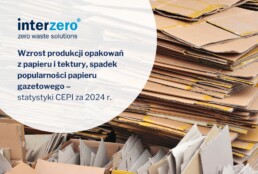
Paper and board packaging production up, newsprint down - Cepi presents preliminary statistics for 2024.
The Confederation of the European Paper Industry (CEPI) has published preliminary paper industry statistics for 2024. The latest figures herald a thaw - after years of post-pandemic declines, we have finally seen increases, and in almost all paper and board categories. However, the entire industry faces entirely new challenges.
Packaging responsible for 63% overall paper production
Let's start with the key statistics for the packaging and recycling industries. As Cepi's preliminary statistics show, up to 63% of the paper and board produced in 2024 was packaging paper. This sum consists of:
- corrugated cardboard - 41.2%,
- packaging papers - 5.5%.
- other packaging papers - 16.3%,
Moreover, compared to 2023 Packaging paper production volumes increased by an average of 6.5%. The largest increases (14.4%) were recorded in the segment of packaging papers used in the manufacture of paper bags. In second place (9.9%) were cardboard and other packaging boards used for retail packaging. Corrugated board (up 4.3%) used primarily for the production of bulk and transport packaging completed the podium.
Increases in paper packaging production volumes were followed by increased use of recycled paper. In year-on-year terms, it amounted to 4,1%.
Growth in consumption and production in Cepi countries and globally
As reported in Cepi's preliminary report, in 2024 the member countries recorded a 5.2% increase in paper and board production, reaching 77.8 million tonnes. The industry also grew globally over the same period, with global paper and board production increasing by 3.6% by 2023.
The increase in paper production in the Cepi States was also accompanied by a substantial 7.5% increase in consumption of paper and paper products. Interestingly, almost all paper categories grew except newsprint, which saw a 1.3% decline in 2024, mechanical coated paper (down 2.1%) and uncoated paper (down 3%).
See what raw materials are used to make paper in Europe >>
Jori Ringman, CEO of Cepi, said:
Recently, we have seen positive signs of growth in the pulp and paper sector. Whether this growth can be sustained depends partly on what the EU institutions do so that we can compete on a level playing field not only with other pulp and paper producers in the world, but also with fossil-based industries.
Paper and packaging industry under pressure from consumers
European paper and board packaging companies therefore face 2 huge challenges: remaining competitive against global leaders from outside the EU and meeting the increasingly high expectations of consumers, who are looking closely not only at recyclability but also at packaging sizes.
Mondi's latest survey shows that simply protecting the product is no longer enough, with 78% respondents indicating that the recyclability of shipping packaging is either important or very important to them. 80% Researcher wants environmentally friendly packaging, while the 71% prefers paper-based raw material packaging. At the same time consumers are not prepared to pay extra for more sustainable packaging - 38% of them puts the matter on a knife edge and will not pay a penny more. 27% may pay more by a token 1%. Interestingly, the boomer generation will be the most likely to pay extra for the green package, with Gen Z resisting the strongest.
Consumers are therefore making demands, but they are also making the boundaries clear - The packaging is supposed to be environmentally friendly, fit properly, easy to open and reclose and free, at least from their perspective. As far as 40% of those surveyed will in future avoid retailers who use excess packaging, and 20% will abandon the purchase due to the lack of sustainable packaging.
Sources:
- Cepi, Preliminary statistics 2024. European pulp & paper industry, https://www.cepi.org/wp-content/uploads/2025/02/FINAL-Cepi-Preliminary-Statistics-2024.pdf
- Mondi Group eCommerce trend report: Sustainability and its impact on packaging and online shopping choices, https://144089501.fs1.hubspotusercontent-eu1.net/hubfs/144089501/Group%20eCommerce/Mondi%20Group%20eCom%20trend%20report%202025.pdf
Record recycling of aluminium beverage cans
Record recycling of aluminium beverage cans in Poland and across Europe
The European aluminium can recycling industry is on track to achieve 100% circularity in 2050. According to the latest figures, in 2022 the recycling rate of this popular beverage packaging was almost 75%, with an increase of 10,000 tonnes of recovered aluminium. Could something stand in the way of a complete closure of the circulation?
Europe has returned 74.6% of aluminium cans to circulation
On 10 February 2025, a report by Metal Packaging Europe and European Aluminium was published, showing that up to 74.6% of aluminium beverage cans placed on the market will be recycled throughout 2022. In percentage terms, this result represents a slight (1%) decrease compared to 2021, so why the mentioned record?
As the report reads in 2022. the total amount of aluminium recovered from beverage cans was a record 580,000 tonnes.. On an annual basis, we have therefore seen an increase of 10,000 tonnes (or 1.7%). This is due to increasing consumption - more packaging is brought to market in 2022, and this in turn increased the total weight of packaging waste entering the recycling stream. At the same time, with the collection and sorting system remaining constant, the percentage of recycling (as a percentage) has fallen slightly as a result of the greater increase in the production and consumption of cans[i].
The authors of the report relied on data from the EU Member States, the United Kingdom, Switzerland, Norway and Iceland. How does Poland compare to Europe?
Poland above the European average. How many cans have we recycled?
Beverage can recycling in Poland has remained at a consistently high level for several years. Data from the RECAL Foundation shows that in 2022. the level of recycling of alu cans was as high as 80%. It was only better in 2017-2018 (81% and 80.5% respectively)[ii]..
Poland is among the countries with the highest level of can recycling. We are ahead of 11 countries, most of which already have well-functioning deposit systems. It is in the development of deposit systems in more European countries, representatives of Metal Packaging Europe and European Aluminium see opportunities for a further increase in the percentage of cans returned to circulation.
Packaging director at European Aluminium, Andy Doran, commented:
"The continued high level of recycling reinforces our belief that we are moving in the right direction. The latest results also show that it is a marathon, not a sprint. 2022 has seen the implementation of several deposit schemes and as they mature, recycling rates will continue to rise."
CEO of Metal Packaging Europe, Krassimira Kazashka, she added:
"We welcome the latest results and believe that the industry remains on track to achieve 100% circularity of aluminium cans by 2050. [...] Following the EU's recent adoption of the Packaging and Packaging Waste Regulation, we encourage Member States to implement sustainable and efficient deposit systems that enable full circularity of aluminium cans through 'can-to-can' recycling."
Increased aluminium recycling means reduced environmental burden
The Metal Packaging Europe and European Aluminium report also refers to the environmental benefits of recycling aluminium packaging waste. In 2022, the processing of just one type of waste - an aluminium beverage can - allowed the reduce emissions by 5.4 million tonnes of CO₂eq (carbon dioxide equivalent). This amount corresponds to the annual emissions of a city with more than half a million inhabitants, such as Oslo or Genoa.
Read more about the environmental benefits of aluminium recycling in the article: Aluminium recycling - can you close the loop in 60 days?
Sources:
[1] Metal Packaging Europe and European Aluminium, Record Number of Used Aluminium Beverage Cans Recycled as Industry Drives Toward 100% Circularity by 2050, https://european-aluminium.eu/wp-content/uploads/2025/02/EA-MPE-BevCan-2022-Recycling-Results-Press-Release-10-February-2025.pdf.
[2] Recycling, https://recal.pl/recykling/
32 million plastic bags a year. Polish fashion e-commerce is drowning in waste

32 million plastic bags a year. Polish fashion e-commerce is drowning in waste
Last year, Polish fashion e-commerce used as many as 16 million plastic bags. This figure is set to double in the coming years, to a skyrocketing 32 million a year. This trend does not necessarily please consumers - almost ¾ of them prefer to receive a parcel wrapped in paper and cardboard rather than plastic. What does the fashion industry have to say about this?
The environmental costs of the fashion industry are not just about textile waste
We don't like it and we love it at the same time - the fashion industry has long had the patch of being one of the least environmentally friendly, but that hasn't stopped it from reaching new production and sales records. According to an analysis by Business Insider Fashion companies account for 10% of global carbon emissions. By comparison, the same amount is emitted by the entire European Union!
- Every year, 100 million garments and 92 million tonnes of textile waste are produced worldwide.
- The textile industry consumes 10-20% of all pesticides used worldwide.
- Each year, for the production of cellulose fabrics, a more than 150 million trees, of which 30% are from primary or endangered forests.
- Textiles is responsible for 20% of global water pollution[i].
- The fabric dyeing process alone generates approx. 93 billion m3 sewage[ii]..
The figures quoted are for textiles alone. It is worth remembering that the fashion industry is not only about the production of clothing, but also about logistics and retailing, including online. The latter contributes to generation of waste from shipping containers, looked at by Development Economics in a study commissioned by DS Smith, the global leader in sustainable packaging.
2,500 every hour, 147 million in 5 years - that's how many plastic bags Polish fashion e-commerce will generate
DS study. Smith shows that in the coming years The Polish fashion e-commerce sector will use as much as 32 million pieces of plastic packaging shipping per year, which will translate into more than 2500 bags delivered every hour. By 2030, as many as 147 million plastic bags will be used in this way.
- While online sales are increasing, online retailers are using more plastic bags compared to stationary shops. - says Katarzyna Kala-Kowalska, CEO of DS Smith Polska.
It might seem that in an era of increasing environmental awareness, both companies and consumers are increasingly moving away from plastic in favour of more sustainable alternatives. However, the statistics are inexorable - among the large European economies, it is the Poland is the fastest growing market for mail order plastic packaging, so readily used by fashion e-commerce, among others. It comes as no surprise, then, that experts forecast as much as 102% increase in plastic bag consumption (from 16md to 32bn) by 2030.
The plastic garment bag has only 1 life - lack of recycling a sore point for Polish e-commerce
Plastic mailing bags are almost never recycled. Only 6% of such packaging used by fashion e-commerce was reused or recycled. The remaining 94% of waste ended its life after just 1 use in either a landfill or incinerator.
Is there an alternative to plastic bags?
As much as possible. Quite the obvious substitute for plastic is paper (classic and expanded envelopes) and cardboard (cartons, cardboard boxes, corrugated envelopes).
- The switch from plastic to paper mailing bags was a turning point. Following the introduction of our first paper bags, customer satisfaction with our new packaging increased by 16 percentage points year-on-year. - says David Fischer, Head of Sustainable Logistics and Packaging at Zalando.
Zalando's observations are also confirmed by the results of the DS study. Smith:
- 57% Polish consumers feel remorse about the amount of plastic in which their orders are delivered.
- 77% wants to phase out plastic bags if replacements are available.
- 72% respondents say they prefer to receive their purchases packaged in cardboard or paper.
- 56% declare that they would be more likely to order from a clothing shop that uses recyclable packaging.
- Eliminating single-use plastic products remains a key challenge for the e-commerce industry in achieving sustainability goals. Finding the ideal solution is quite a challenge, especially in an environment where more sustainable alternatives are not yet fully scalable or may not meet the minimum requirements in terms of both sustainability and operational implementability. - David Fischer adds.
Many mail order packaging companies are now testing reusable packaging. From 2023 onwards, InPost offers deliveries in EkoBox, a collapsible package that can be returned via Parcel Machine. The developer of innovative reusable packaging for e-commerce was also the Loopako brand, which has now gone out of business. In favour of such solutions are not only environmental and image considerations, but also the possibility of optimising the use of reusable packaging. product levy for the packaging introduced and the opportunity to reduce the cost associated with the transfer of the recycling obligation to a recovery organisation. Instead, a significant downside could be the increase in emissions caused by the return of such packages, as well as the cost of the courier service that fashion e-commerce would have to bear.
Source: DS. Smith, Let plastic go out of fashion: by 2030, online fashion shops inPoland will use 147 million plastic bags, https://www.dssmith.com/pl/media/aktualnosci/2025/4/pozwolmy-plastikowi-wyjsc-z-mody-do-2030-roku-internetowe-sklepy-z-moda-w-polsce-zuzyja-147-milionow-plastikowych-toreb
[i] 10 frightening statistics on fast fashion, https://magazynbiomasa.pl/10-zatrwazajacych-statystyk-dotyczacych-fast-fashion/
[ii]. K. Shedlock, S. Feldstein, At what cost? Unravelling the harms of the fast fashion industry, https://www.biologicaldiversity.org/programs/population_and_sustainability/pdfs/Unravelling-Harms-of-Fast-Fashion-Full-Report-2023-02.pdf
Ministerial draft ROP under a wave of criticism from manufacturers
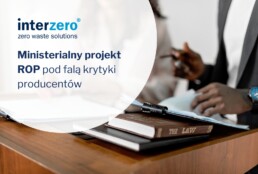
Ministerial draft ROP under a wave of criticism from manufacturers
We know the assumptions of the Extended Producer Responsibility (EPR) system, which the Ministry of Climate and Environment has been working on for some time. However, the eagerly awaited ROP model differs significantly from what entrepreneurs and environmental experts had expected.
Basic assumptions of the ministerial draft ROP
At the end of February, statements by members of the advisory team for systemic solutions for waste management, which operates under the Ministry of Climate and Environment, appeared in the media, from which the concept of the ROP model being developed by the Ministry of Climate and Environment emerged more and more clearly, and in recent days the Ministry in the Polish Parliament presented its assumptions. What will be its main assumptions?
- One system operator
According to the Ministry's plan, the operator of the ROP system is to become the National Fund for Environmental Protection and Water Management, whose main task will be to ensure that the required recycling levels for packaging waste are met.
- Costs for introducers
The costs of packaging waste management will be borne by the introducers of packaged products. The Ministry envisages setting, by way of a regulation, fixed rates of the public charge, which will be transferred by the introducers through marshal offices to the NFOŚiGW account. The fee rates will be lower the more the packaging demonstrates its recyclability.
- Disbursement of the proceeds of the levy by NFOŚiGW
The funds from the financial contributions made by the introducers will be distributed between:
- municipalities, depending on the weight of packaging waste collected and in addition as compensation for the maintenance of the municipal waste collection system,
- treatment facilities, depending on the weight of packaging waste sorted and sent for recycling,
- recycling facilities for waste with a negative market value, depending on the mass of waste recycled.
Part of the funds will also go to environmental education and to cover the investment gap of the packaging waste management system.
- Responsibility for achieving recycling levels on the part of NFOŚiGW
The sole responsibility for ensuring that the recycling levels set by the EU are achieved will rest with the sole and, in addition, state-owned operator of the system, the NFOŚiGW. Under the current system, producers can transfer this responsibility to any recovery organisation of their choice.
- The role of local authorities
Municipalities will continue to be responsible for organising the collection and for managing the collected municipal waste. In return for these activities, the municipalities will receive (as well as the installations) compensation at a fixed amount to facilitate long-term planning.
Other assumptions of the draft ROP
- further introducers and further installations will be able to join the system at any time,
- the system operator will not acquire ownership of the waste at any stage of its management,
- waste holders will not be obliged to hand over their waste to specific recipients (installations),
- the various stakeholder groups will be represented on the dialogue council set up for the ROP system.
Ministerial ROP proposal at odds with environmental policy goals
Paradoxically, the Ministry's proposed ROP system may consequently lead to problems in meeting waste recycling targets packaging.
This is because the proposal of the Ministry of the Environment transfers the responsibility for achieving these recycling levels from entrepreneurs (introducers) to the state (NFOŚiGW). Titled the producer's liability is therefore limited to financial liabilitywhich consists of setting aside a pre-determined amount in the company's monthly budget and transferring it to the correct account. In contrast, the organisational responsibility of introducers and the need to ensure, in accordance with the Waste Directive, the efficiency of the ROP system have been completely disregarded.
Similar solutions are currently in place in only 2 EU countries (Hungary and Croatia), and in both of them, businesses are faced with the high costs of operating the systems and the state with the real risk of not meeting the 2025 targets set by Directive 94/52/EC.
Such an ROP will not change anything - a levy to the National Environmental Protection and Water Management Fund like a new tax
The public charge envisaged in the ministerial ROP model will be nothing more than a new environmental para-tax and a will not meet the condition of cost-effectiveness announced by the IOC. Moreover, such the solution will be contrary to Directive 2008/98/EC on waste, and thus with the legal act that de facto obliged Poland to introduce the ROP provisions. The Directive requires that the financial contributions paid by introducers to fulfil their obligations under the ROP should not exceed the costs necessary to provide waste management services in a cost-effective manner. These costs should be determined transparently between the stakeholders themselves and not top-down, as proposed by the IOC.
According to Konrad Nowakowski, President of the Polish Chamber of Packaging Recovery and Recycling:
The proposed ROP model does not achieve the basic objectives of environmental policy - it does not contribute to increased recycling or the development of a circular economy. In practice, it becomes another tax imposed on businesses, with no mechanisms to ensure that the funds are used efficiently.
Lack of incentives for recycling and eco-design
The current financial liability mechanism in the form of a product fee significantly affects the motivation of these entities towards not only eco-design, but also ensuring the required recycling levels. Fixed, predetermined fee rates, the introduction of which is envisaged by the ICE model, will not give those introducing packaged products any influence on the functioning of the system. Nor will they take into account the dynamically changing costs of waste management.
The effect of continuing the project on the basis of the ministerial assumptions may even be the abandonment of research and development work currently being carried out by entrepreneurs to develop packaging with minimal environmental impact. The investment expenditures incurred would not be returned to the producers in the future - instead of the expected return on investment, a predetermined fee would be imposed on the producers, which would in no way reward "green" packaging.
Centralised system incompatible with Directive 2008/98/EC
The contradiction of the ministerial ROP model with EU legislation does not only manifest itself at the level of cost-effectiveness. As experts point out, a centrally administered system, with the NFOŚiGW becoming the monopoly, is incompatible with Article 8a of Directive 2008/98/EC on waste. These provisions provide for the possibility of setting up multiple organisations in each Member State to carry out ROP obligations on behalf of product manufacturers, while requiring Member States to designate one or more authorities to supervise in such a situation.
In addition, the preamble of the recently enacted Regulation (EU) 2025/40 of the European Parliament and of the Council of 19 December 2024 on packaging and packaging waste (PPWR) indicates that producers should be able to collectively fulfil their ROP obligations through authorised producer responsibility organisations. Member States may instead authorise multiple liability organisations - as indicated in recital 130, competition between these organisations can lead to greater benefits for consumers.
In the ministerial proposal of the ROP, there will be a state system administrator acting on the basis of statutory authority rather than authorisation, but no producer responsibility organisations will be created, contrary to recital 130 above.
The end of recovery organisations means the end of environmental synergies
Following the announcement of the ministerial concept of ROP, business representatives called in large numbers for the Ministry of Climate and Environment to stop drafting a bill based on this model and initiate a public discussion on the creation of an optimal model for the Polish economy, the organisation of which will be influenced by those introducing packaged products.
As industry experts point out, the introduction of the ROP system, in the form proposed by the IOC, would entail the end of the activities of all packaging recovery organisations (PROs), which are currently not only entities fulfilling the statutory obligations of producers. Their role is much broader - the majority of OOOs offer comprehensive, integrated solutions for companies aimed at optimising waste management, minimising the carbon footprint of packaging, products and services, as well as expert support in fulfilling other obligations under environmental regulations. The OOO's activities thus create a series of synergies that bring real benefits to the economy, the environment and citizens. Indeed, let us not forget that it is the recovery organisations that carry out public education campaigns on behalf of their clients and have been making efforts for years to ensure that action in favour of recycling and the GOZ is taken not only by businesses and decision-makers, but also by increasingly aware consumers.
Omnibus will change ESG reporting. Highlights of the ESG reporting simplification package
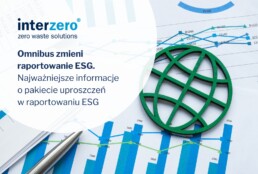
Omnibus will change ESG reporting. Highlights of the ESG reporting simplification package
26 February 2025. The European Commission has unveiled its announced sustainability simplification package. Omnibus I is the first of the expected packages, which aim to increase the competitiveness and investment attractiveness of EU companies.
Omnibus Simplification Package I - Basic assumptions
Omnibus I is a package of proposals aimed at simplifying EU legislation, increasing the attractiveness of EU businesses and unlocking additional investment opportunities. According to EC estimates, it will result in 25% reduction in administrative burden for those required to report on sustainability, with the burden to be reduced by as much as 35% in the SME sector.
The changes outlined in the Omnibus I package will mainly concern:
- sustainable finance reporting,
- due diligence on sustainability reporting,
- EU taxonomy,
- Carbon Boundary Adjustment Mechanism (CBAM),
- European investment programmes.
According to the EC's calculations, the implementation of the announced proposals will yield savings of EUR 6.3 billion and will result in an increase in private and public investment of €50 billion. As announced by the head of the EC, Ursula von der Leyen, further simplifications are already' on the way'.
Omnibus I will postpone mandatory ESG reporting and ease the burden on SMEs
The simplification package adopted by the EC implies several key changes:
- Postpone by two years (to 2028) the reporting requirements for companies currently covered by the CSRD, which are obliged to report from 2026 or 2027.
- By 80%, the number of entities covered by the sustainability reporting obligation will be reduced.
- Sustainability reporting will mandatory only for large entities with more than 1,000 employees and a balance sheet total of more than EUR 25 million or net revenue of more than EUR 50 million.
- By limiting the information reported in the value chain, the ESG reporting requirements imposed on the largest companies will not burden small entities.
Reducing the burden on SMEs also involves on reducing the frequency of periodic evaluations and monitoring partners from annual to five-year intervals. However, if there is a legitimate need, the ESG reporting entity will be able to perform an ad hoc assessment.
Importantly, Omnibus I upholds the possibility of voluntary ESG reporting for entities that will in future fall within the scope of the CSRD. In this way, the EC wants to ensure that companies have access to sustainable financing, the obtaining of which in many cases involves non-financial reporting.
Reduction and simplification as key tenets of the Omnibus I package
In addition to narrowing the range of entities covered by the effects of the CSRD, the European Commission also intends to reduce the costs associated with the preparation of ESG reports. Omnibus I promises businesses a reduction in the expense of attesting ESG reporting. This is all thanks to waiving attestation at a sufficient level of assurance (reasonable assurance.) Instead, only limited assurance will be required.
The Omnibus package also included information on the simplification of ESRS standards by reduction of ESG disclosures. Furthermore, the EC announced that so-called sectoral standards, i.e. sets of guidelines taking into account the specificities of individual industries, will also not be adopted. Entrepreneurs will also gain the possibility to report on activities that are partly in line with the EU taxonomy. This approach is intended to support a gradual transformation towards sustainability.
What else will change with the introduction of the Omnibus?
- There will be a substantial simplification of reporting templates. Omnibus I announces a reduction in their number by as much as 70%.
- Small importers will be excluded from the CBAM (so-called carbon tax) mechanism and the obligation of quarterly reporting. For other importers, the mechanism will be simplified.
EU sets course for competitiveness and climate goals
The Omnibus I simplification package proposed by the EC constitutes a sort of trade-off between climate and economic objectiveswhich the Community intends to achieve. The loosening of reporting rigour and climate policy is a response to the current economic and political situation, which requires the creation of conditions for more dynamic economic development. The proposed direction of change is likely to result in creating a more business-friendly environment which will help businesses in the EU to grow, innovate and create more jobs.
A series of simplifications and reliefs are also followed by financial incentives. The Commission has proposed a series of amendments aimed at enabling greater use of EU investment programmes InvestEU and EFIS, among others. It is expected to mobilise around EUR 50 billion in additional public and private investment, make it easier for Member States to support innovative companies and simplify administrative requirements, which have hitherto been a heavy burden on the SME sector in particular.
The detailed scope of the Omnibus I package can be found in on the European Commission website (eng.).
Recycling levy 2026 - who has to pay the charge for advertising bags and when?
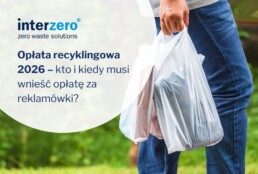
Recycling levy 2026 - who has to pay the charge for advertising bags and when?
Shopkeepers and wholesalers who offer plastic bags to their customers are required to pay a recycling fee. How much is the plastic bag levy in 2026 and by when do you have to pay it? Find out the most important information about the recycling levy.
What is subject to the recycling levy?
The recycling charge applies to all plastic shopping bags with the exception of so-called rip-offs, which are very lightweight bags made of material less than 15 micrometres thick:
- necessary for hygiene reasons,
- used as primary packaging for food sold in bulk (as long as they prevent food waste).
This means that the recycling charge is not levied on, for example, carrier bags on a roll or plastic bags used to package fresh bread, fruit and vegetables, meat, cheese, etc.
Obligations of the economic operator relating to the recycling levy
Each trader running a shop or a wholesale business (retail or wholesale unit) where plastic shopping bags are offered to customers, is obliged:
- collection of the recycling levy from purchasers (customers),
- payment of the fee collected recycling into the relevant bank account within the agreed deadlines,
- record keeping covering the number of bags purchased and issued (lightweight bags, i.e. 15 to 49 microns, and other bags, i.e. 50 microns and over) either on paper or electronically. Owners of several retail outlets must keep separate records for each outlet,
- submit an annual report on the number of plastic bags purchased and issued to customers (so-called packaging and product reports).
Recycling levy rate 2026 - how much is the charge for commercials?
From 1 September 2019, the rate of the recycling levy is 20 cents per item plastic shopping bags, regardless of their thickness.
The recycling fee may be the total cost of purchasing such a bag or may be added to the price of the bag set by the retailer.
By when is the recycling levy due in 2026?
The recycling charge shall be settled quarterly. It shall be paid by the 15th day of the month following the quarter in which the fee was collected.
In 2026, the recycling fee must be paid:
- For Q1 - by 15 April 2026,
- For Q2 - by 15 July 2026,
- For Q3 - by 15 October 2026,
- for the fourth quarter - by 15 January 2027.
Are you collecting a recycling levy? You are obliged to register with BDO!
Shopkeepers and wholesalers who are obliged to charge a recycling fee are also required to obtain an entry in the BDO register. An application for entry must be submitted prior to the commencement of operations commercial. For selling plastic bags to customers without the required entry in the BDO, a trader can be fined from PLN 1,000 to PLN 1 million!
Want hassle-free paperwork? Entrust your BDO registration to the experts at Interzero!
After registration with BDO you will receive a registration number, and the province marshal will create an individual account for your company in the system and send you an activation link. An account in the BDO register is necessary for the submission of the annual report on the number of bags with a thickness of 15 to 49 micrometres and 50 micrometres and above purchased and issued to customers - this obligation can only be fulfilled electronically!
Source and legal basis:
https://isap.sejm.gov.pl/isap.nsf/download.xsp/WDU20130000888/U/D20130888Lj.pdf
https://isap.sejm.gov.pl/isap.nsf/download.xsp/WDU20190001639/O/D20191639.pdf
FAQ
Find out the answers to the most common questions about the plastic bag recycling charge.
Recycling charge the purchaser (usually the consumer) pays plastic bags. The trader selling the bag only collects the recycling fee and passes it on to the to the Marshal.
The recycling fee covers all plastic bags with the exception of very lightweight bags (with a material thickness of less than 15 micrometres) used for hygiene reasons or as primary packaging for bulk food products (provided they prevent food waste).
Yes, provided they are made available to purchasers for hygiene reasons or as primary food packaging sold in bulk. In other cases, e.g. when so-called rip-offs are used to package products or products other than food, a recycling fee must be paid for them.
Yes. The purchaser of the plastic bag is obliged to pay the recycling fee and the trader selling the bag is obliged to collect it and then transfer it to the bank account of the provincial marshal within a certain period of time. Exceptions are bags with a material thickness of less than 15 micrometresas long as they are used for hygienic reasons or as primary packaging for bulk food to prevent waste.
The recycling fee collected from customers shall be paid to to an account held with the marshal of the province with jurisdiction over the place of business economic.
Not. The recycling levy provisions only apply to plastic bags.
Do you want to offer your customers more sustainable alternatives to plastic bags? Find out what to replace rip-offs and single-use plastic bags with!
Environmental Report 2025
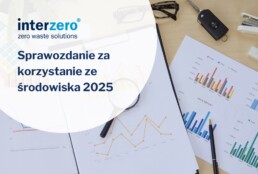
Environmental Report 2025
Entities that discharge gases or dust into the air and landfill waste are required to submit annual reports and calculate the fees due. These obligations stem from the Environmental Protection Law and apply not only to companies, but also to institutions, individuals and other entities that use the environment.
What is an environmental report?
The environmental report is a document prepared annually by companies, institutions and individuals using the environment. It contains information on the extent to which the entity concerned has used the environment and the level of chargesthat he should bear as a result.
A report on the use of the environment may consist of one or more lists - the number and type of lists depends on the type of activity carried out by the entity concerned and the extent to which it has used the environment.
Who has to report on the use of the environment?
A report on the use of the environment must be submitted entities which in a given calendar year:
- introduce gases or dust into the air originating from various processes (e.g. boiler house, use of company internal combustion vehicles, poultry rearing or breeding),
- had emission allowances issued,
- dumped waste.
These entities include:
- entrepreneurs (also foreign),
- organisational units that are not businesses (e.g. foundations, associations, schools),
- persons engaged in agricultural production activities, e.g. farming, animal husbandry, horticulture, vegetable farming, forestry and inland fishing,
- other natural persons who use the environment to the extent that a permit is required.
Importantly, there is no obligation to submit a report if the calculated annual fee for one type of environmental use does not exceed PLN 100.
By when to submit information on the use of the environment for 2025?
The environmental use report for a calendar year must be submitted by 31 March of the following calendar year.
This means that the deadline for submitting the environmental use report for 2025 is 31 March 2026. We would like to remind you that the deadline for payment of the fees calculated in the report expires on the same day!
How to submit an environmental report?
A report on the use of the environment shall be submitted to the marshal of the province having jurisdiction over the place of use of the environment:
- in person (during a visit to the marshal's office),
- by letter,
- electronically (via ePUAP), signing the document with a qualified signature or trusted profile.
Environmental users may also entrust the preparation and submission of the environmental inventory to Interzero's experts. We have been fulfilling reporting obligations for our clients for many years. We therefore have a long track record and a wealth of experience in providing comprehensive, professional services to various environmental users. Write to us at our e-mail address or use the contact form. We will help you identify your responsibilities and file the necessary documents on your behalf: quickly, reliably and without taking up your time.
Explore our full range of environmental reporting >>
If you use the environment, then You can also prepare the report yourself by filling in:
- mandatory: a list containing a summary of information on the scope of use of the environment (if the fee for use of the environment exceeds PLN 100),
- if you introduce gases or dust into the air: a list containing information on the amounts and types of gases or dust which are introduced into the air,
- if you have emission allowances: an inventory containing information and data on the volume of greenhouse gas emissions covered by the emissions trading scheme and the number of emission allowances and the amount of fees payable,
- if you store waste: a list containing information on the waste deposited.
Current you will find models for these lists in the annexes to the Regulation Minister of Climate of 11 December 2019 on lists containing information and data on the scope of use of the environment and the amount of fees payable (Journal of Laws 2019, item 2443).
The EcoPłatnik application, which is made available by some Marshal Offices, helps to prepare the report. However, once the report has been prepared, it must be submitted in one of the forms mentioned above.
FAQ
Find out the answers to the most common questions about the environmental use report.
Inventory and information on the extent of environmental use do not have to shall be submitted by entities for which the calculated annual fee for one type of use of environment shall not exceed PLN 100.
Information on the use of the environment shall be submitted:
- in person at the marshal's office with jurisdiction over the place of use of the environment,
- by letter to the address of the Marshall Office competent for the place of use of the environment,
- electronically (via ePUAP), signing the document with a qualified signature or trusted profile.
Please note that the reports prepared in the EcoPayment Service must then be submitted in one of the ways indicated! The service does not allow for automatic submission of documents.
Depending on your type of business, you will need to complete one or more of the lists listed:
- mandatory: a list containing a summary of information on the scope of use of the environment (if the fee for use of the environment exceeds PLN 100),
- if you introduce gases or dust into the air: a list containing information on the amounts and types of gases or dust which are introduced into the air,
- if you have emission allowances: an inventory containing information and data on the volume of greenhouse gas emissions covered by the emissions trading scheme and the number of emission allowances and the amount of fees payable,
- if you store waste: a list containing information on the waste deposited.
NOTE: If the fee calculated for a given calendar year for one type of environmental use does not exceed PLN 100, you do not need to fill in or submit any of the lists!
You do not have to pay for the use of the environment in the case of, when the fee for a given calendar year for one type of use of the environment does not exceed PLN 800. If, at the same time, this fee is more than £100, you are obliged to submit the report within the statutory deadline
Yes. However, it is important to note that the provincial marshal may calculate the fee on the basis of his own findings or findings made as a result of a WIOŚ inspection of your company. Therefore we encourage the payment of all reporting backlogs as soon as possible. Our experts will be happy to help you identify all your company's obligations and complete outstanding and ongoing paperwork. Write to us and find out how we can help you!
